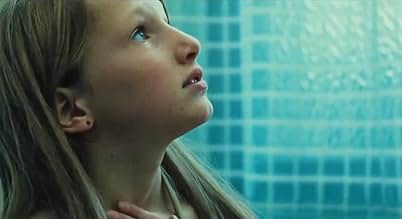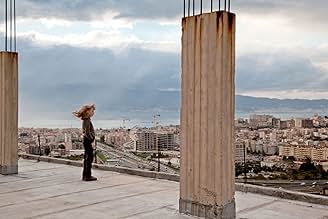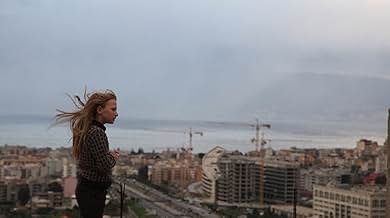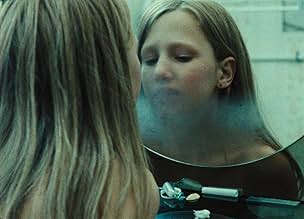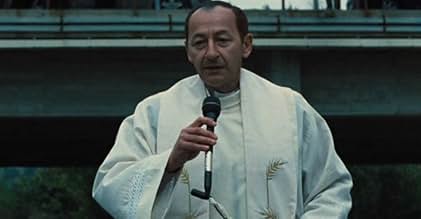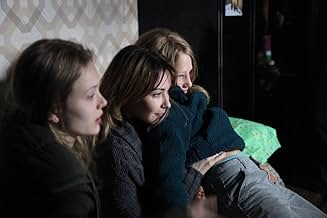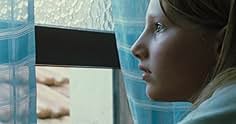IMDb-BEWERTUNG
6,8/10
2317
IHRE BEWERTUNG
Füge eine Handlung in deiner Sprache hinzuThirteen year-old Marta has recently moved back to southern Italy with her mother and older sister and struggles to find her place, restlessly testing the boundaries of an unfamiliar city an... Alles lesenThirteen year-old Marta has recently moved back to southern Italy with her mother and older sister and struggles to find her place, restlessly testing the boundaries of an unfamiliar city and the catechism of the Catholic church.Thirteen year-old Marta has recently moved back to southern Italy with her mother and older sister and struggles to find her place, restlessly testing the boundaries of an unfamiliar city and the catechism of the Catholic church.
- Regie
- Drehbuch
- Hauptbesetzung
- Auszeichnungen
- 10 Gewinne & 10 Nominierungen insgesamt
Yile Yara Vianello
- Marta Ventura
- (as Yle Vianello)
Giovanni Federico
- Nino
- (as Gianni Federico)
Monia Alfieri
- Donatella
- (as Monica Alfieri)
Empfohlene Bewertungen
This is the movie which can be discuss for years to come. A young pre-adolescent girl from Switzerland, where there is freedom of religion, who goes to Catholic dominated Italy to live with her Mother and older Sister who pesters her. Imagine the cultural shock of a contrast country. Add to this, the coming of adolescent age with its confusion and rebellion. Survival is challenging despite the indoctrination of a religious sense to keep people living within the teachings of the church. One sees a battle between moral values and self preservation. Plus, the struggle of an innocent child who wants to live the right way in a world that acts on human self righteousness and desires. This film will take you on a ride which leaves you in a hopeless state of not knowing who to believe or what to believe. Yet, among all the world lust, hypocritical situations, and unfairness... we can survive. We are a miracle. Especially when we put our faith in spiritual understanding. A thought provoking film which will question your own beliefs and understanding.
I finally caught up with Alice Rohrwacher's filmography and watched her debut feature, «Corpo celeste», made nine years ago and for which she won several awards as new director and for best first film. Since then, we have seen a talented filmmaker who is maturing with outstanding works, as «Le meraviglie»" (story of a family that owns an apiary) and «Lazzaro felice» (portrait of an immensely good-natured young man).
This is a subtle drama about growing up and enlightenment, about Marta (Yile Yara Vianello), a beautiful and sensitive girl who becomes a nubile adolescent, during the summer when she is going to receive the sacrament of confirmation in the Catholic church. Marta has just arrived from Switzerland to Reggio di Calabria, an Italian city controlled by the mafia, and she does not find it easy to fit into a small-town congregation of sanctimonious men and women with apocalyptic hearts, a bit silly peers and Don Mario, the parish priest who leads a double life: it is election time and he is seeking a promotion in the ecclesiastical hierarchy. To round things up, add Santa, his housekeeper and Sunday school teacher, who secretly loves him; and, on the personal side, Marta's family picture, made up of a single mother and three daughters, which Rohrwacher portrays as a vivid, volatile and affectionate nest.
Spaces and environments are always special in Rohrwacher's films and, besides her documentaries, here is a seed: we have seen many rugged European villages, carved out of mountains, between ascending curves, with rustic houses crowded one on top of the other, but the brief scenes in which the director's camera enters a house and a church in ruins, it is enough to reveal the desolation of the place; and, in the end, the film opens up (not closes, for it is not a "denouement", the film does not "untie plot knots", but fluently runs through emotions, situations and demonstrations) when Marta unexpectedly arrives to the sea, which, in the characters' fantasies, is alluded as a place of escape and repose.
A very good film, «Corpo celeste» is a preview of Alice Rohrwacher's next two major works, which I hope is enjoyed by those persons who love good cinema from all over the world.
This is a subtle drama about growing up and enlightenment, about Marta (Yile Yara Vianello), a beautiful and sensitive girl who becomes a nubile adolescent, during the summer when she is going to receive the sacrament of confirmation in the Catholic church. Marta has just arrived from Switzerland to Reggio di Calabria, an Italian city controlled by the mafia, and she does not find it easy to fit into a small-town congregation of sanctimonious men and women with apocalyptic hearts, a bit silly peers and Don Mario, the parish priest who leads a double life: it is election time and he is seeking a promotion in the ecclesiastical hierarchy. To round things up, add Santa, his housekeeper and Sunday school teacher, who secretly loves him; and, on the personal side, Marta's family picture, made up of a single mother and three daughters, which Rohrwacher portrays as a vivid, volatile and affectionate nest.
Spaces and environments are always special in Rohrwacher's films and, besides her documentaries, here is a seed: we have seen many rugged European villages, carved out of mountains, between ascending curves, with rustic houses crowded one on top of the other, but the brief scenes in which the director's camera enters a house and a church in ruins, it is enough to reveal the desolation of the place; and, in the end, the film opens up (not closes, for it is not a "denouement", the film does not "untie plot knots", but fluently runs through emotions, situations and demonstrations) when Marta unexpectedly arrives to the sea, which, in the characters' fantasies, is alluded as a place of escape and repose.
A very good film, «Corpo celeste» is a preview of Alice Rohrwacher's next two major works, which I hope is enjoyed by those persons who love good cinema from all over the world.
I'm grateful to finally find a film that is sensitive, subtle, original in its view of people and has something to say (about faith and the church, society and outsiders.) It's Italian, but only two characters act like the Italian angry prototype, and only briefly. The acting is extraordinary. Yle Vianello, who plays the thirteen years old girl, seems as authentic as it gets. It is her story-after ten years in Switzerland, she returns to a small town in Italy with her single mother and 18-year-old sister. Right away she's called to participate in the endless studies for the communion at church. She tries to fit in, but is swept by other types of emotional and spiritual searches.
Marta(Yil Vianello) is a twelve-year-old girl preparing for her Confirmation at a church in Calabria. The waif-like kid has some serious questions about all that she is being taught to believe for her official entry into the Holy Apostolic Church.
The parish priest is seen gathering signatures in support of a local candidate for political office. So much for separation of church and state. He also has aspirations for a higher position within the Roman Church.
Meanwhile, the local children are seen at practice sessions for their special day. At sixty-five, I have little memory of my own Confirmation in the 1960s.
Vianello is a gem in the lead and pretty much carries this low-key but endearing slice of modern day Italian life.
The parish priest is seen gathering signatures in support of a local candidate for political office. So much for separation of church and state. He also has aspirations for a higher position within the Roman Church.
Meanwhile, the local children are seen at practice sessions for their special day. At sixty-five, I have little memory of my own Confirmation in the 1960s.
Vianello is a gem in the lead and pretty much carries this low-key but endearing slice of modern day Italian life.
Alice Rohrwacher cannot disappoint.
If like myself, you have seen her latter films (and don't skip the documentary La Futura) - and are wonder-ing about seeing this film, rest assured even in her debut, you shall be rewarded.
This film is a little slower or more subtle perhaps than the others. Rohrwacher has not yet put her full faith in nature, but there are gusts of winds that sort of blow the (what else) young teenage female heroine through the town she has recently moved to.
In contrast to the church's literal formula, young Marta goes on her own pilgrimage. She is a misfit both in catechism and her sister's borrowed clothing. The viewer may have to be gentle with her and this film , but ultimately there is a lot going on. Trust in her, as in all of Rohrwacher's adolescent savants. The wisdom of the naif.
I feel like this could pair well with the more grandiose "The Mission." The film is not so much about religion, though it can feel that way. To me the tale is more about abandonment.
Amazing how the director connects a famous phrase from the Bible, Christ's cry - in Greek as part of the aforementioned formula, to the town of Roghudi Vecchio. There is also the subplot of Santa (the real spirit of the small church) and Don Mario (definitely the corporate/corporeal side) - and Santa fearing his abandoning.
There are religious tropes that tantalize through-out, walking on water, loaves and fishes, the blood of innocents - but do not be led into the temptation of trope tagging, instead enjoy the beauty of doubt, and the wrestling with abandonment.
Well that, and Rohrwacher's portrayal of adolescence as somehow more knowing and more flexibly real than rigid structures of catechism and capitalism and the other isms Rohrwacher so strongly distrusts.
If like myself, you have seen her latter films (and don't skip the documentary La Futura) - and are wonder-ing about seeing this film, rest assured even in her debut, you shall be rewarded.
This film is a little slower or more subtle perhaps than the others. Rohrwacher has not yet put her full faith in nature, but there are gusts of winds that sort of blow the (what else) young teenage female heroine through the town she has recently moved to.
In contrast to the church's literal formula, young Marta goes on her own pilgrimage. She is a misfit both in catechism and her sister's borrowed clothing. The viewer may have to be gentle with her and this film , but ultimately there is a lot going on. Trust in her, as in all of Rohrwacher's adolescent savants. The wisdom of the naif.
I feel like this could pair well with the more grandiose "The Mission." The film is not so much about religion, though it can feel that way. To me the tale is more about abandonment.
Amazing how the director connects a famous phrase from the Bible, Christ's cry - in Greek as part of the aforementioned formula, to the town of Roghudi Vecchio. There is also the subplot of Santa (the real spirit of the small church) and Don Mario (definitely the corporate/corporeal side) - and Santa fearing his abandoning.
There are religious tropes that tantalize through-out, walking on water, loaves and fishes, the blood of innocents - but do not be led into the temptation of trope tagging, instead enjoy the beauty of doubt, and the wrestling with abandonment.
Well that, and Rohrwacher's portrayal of adolescence as somehow more knowing and more flexibly real than rigid structures of catechism and capitalism and the other isms Rohrwacher so strongly distrusts.
Top-Auswahl
Melde dich zum Bewerten an und greife auf die Watchlist für personalisierte Empfehlungen zu.
- How long is Corpo Celeste?Powered by Alexa
Details
- Erscheinungsdatum
- Herkunftsländer
- Offizielle Standorte
- Sprache
- Auch bekannt als
- Für den Himmel bestimmt
- Drehorte
- Produktionsfirmen
- Weitere beteiligte Unternehmen bei IMDbPro anzeigen
Box Office
- Bruttoertrag in den USA und Kanada
- 8.919 $
- Eröffnungswochenende in den USA und in Kanada
- 2.263 $
- 10. Juni 2012
- Weltweiter Bruttoertrag
- 347.600 $
- Laufzeit1 Stunde 39 Minuten
- Farbe
- Sound-Mix
- Seitenverhältnis
- 1.85 : 1
Zu dieser Seite beitragen
Bearbeitung vorschlagen oder fehlenden Inhalt hinzufügen


